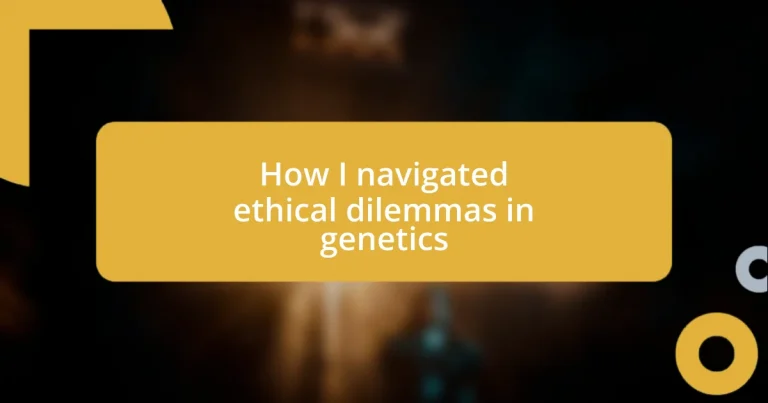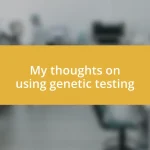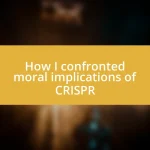Key takeaways:
- Ethical dilemmas in genetics arise from balancing scientific advancements with moral responsibilities, highlighting concerns like privacy and informed consent.
- Personal values significantly influence perspectives on genetic ethics, necessitating open dialogue and continuous reflection among peers to navigate these complexities.
- Engaging in discussions with diverse viewpoints and personal experiences can enrich understanding and foster a community-oriented approach to ethical decision-making in genetics.
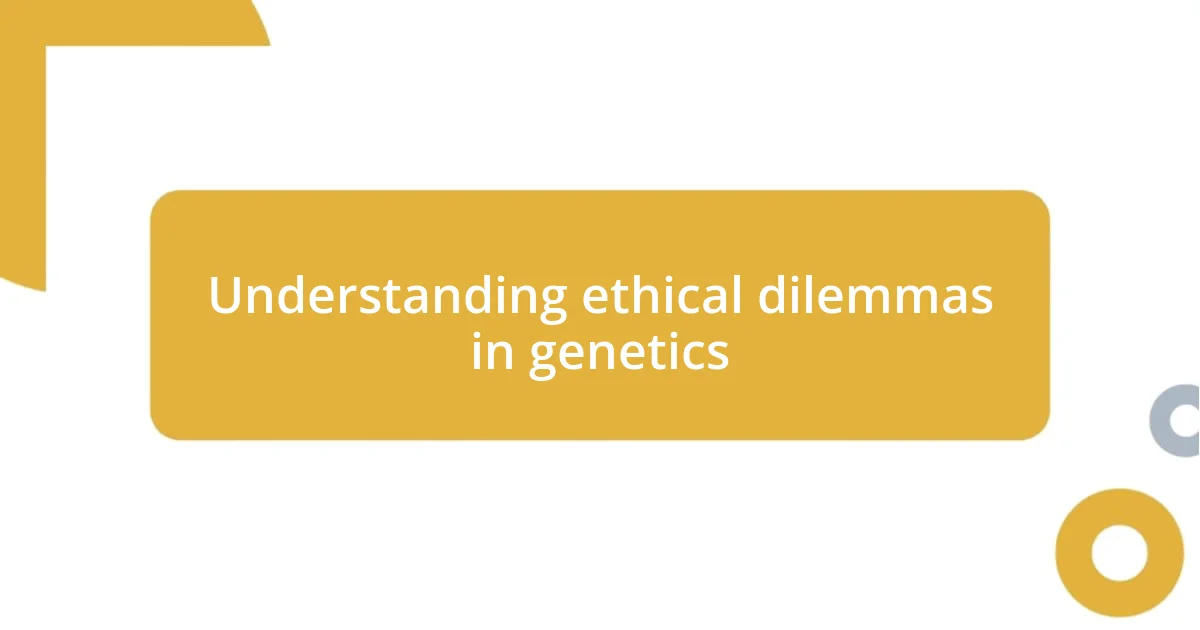
Understanding ethical dilemmas in genetics
In my experience, ethical dilemmas in genetics often stem from the delicate balance between scientific potential and moral responsibility. For example, when I first explored gene editing technologies like CRISPR, I couldn’t help but wonder: where do we draw the line? The thrill of curing genetic diseases seems immense, but could the unintended consequences of such power lead us down a slippery slope?
Reflecting on discussions with colleagues, I recall a particularly heated debate about genetic screening. I was struck by the diverse perspectives: some saw it as a crucial tool for prevention, while others feared it could lead to discrimination or ‘designer babies’. This made me ask myself: how can we ensure that these advancements uplift humanity rather than create new divides? The emotional weight of these conversations lingered in my mind, highlighting the complexity of ethical considerations.
Every time I read about advancements in genetics, I feel a mix of excitement and apprehension. The potential benefits are astonishing, but ethical dilemmas, like privacy concerns and informed consent, continue to arise. How do we protect individual rights in the face of rapid technological change? To me, it’s a constant struggle between innovation and ethics—a challenge that demands thoughtful dialogue and awareness of its societal implications.
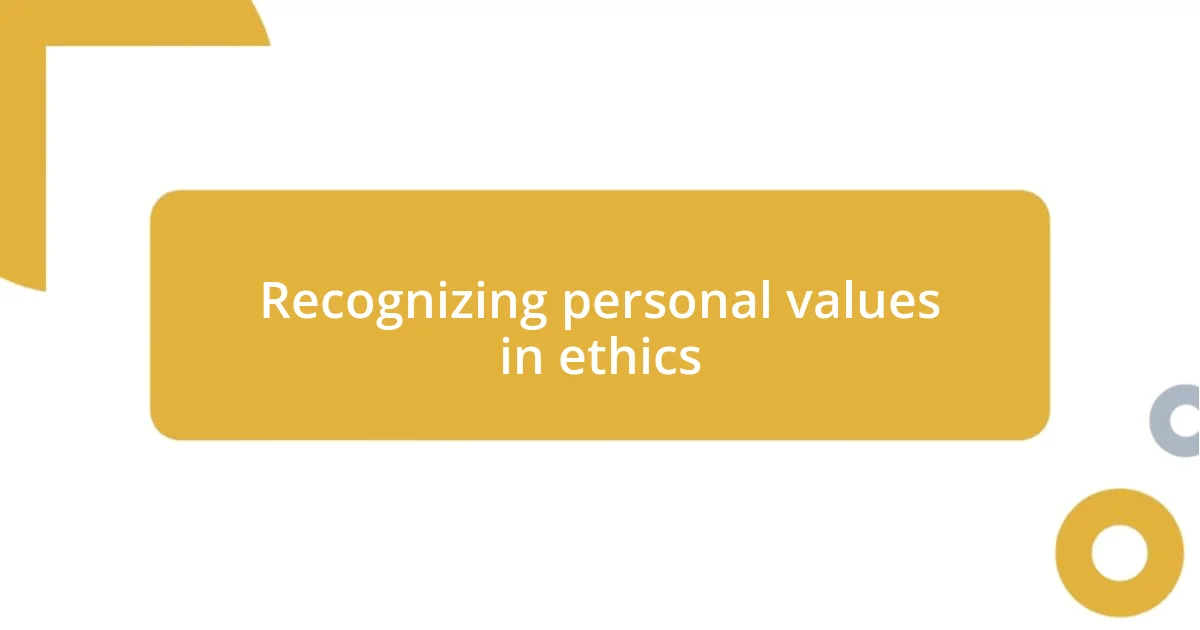
Recognizing personal values in ethics
Recognizing personal values in ethics is crucial when navigating the complexities of genetic advancements. I’ve often found myself reflecting on my core beliefs during discussions about genetic modifications. For instance, sitting in a seminar on gene editing, I felt a shift in my perspective as a colleague shared her personal story of losing a family member to a genetic disease. It reminded me that behind every scientific decision, there are real lives at stake, prompting me to assess how my values influence my views on ethical boundaries.
- Assess your beliefs: What do you prioritize—innovation, safety, or fairness?
- Acknowledge your emotions: Consider how personal stories may shape your understanding of ethical implications.
- Engage in dialogue: Discuss your values with peers to see how they align or contrast with those in the field.
- Reflect regularly: Revisit your beliefs as new advancements emerge; ethics in genetics is a moving target that requires continuous assessment.
I believe that recognizing where our personal values stand in relation to ethical dilemmas not only shapes our decisions but also enriches the discourse surrounding genetics. When I mentor students, I encourage them to examine their convictions. It’s fascinating to see how varied our ethical lenses can be, rooted in personal experiences, cultural backgrounds, or even philosophical beliefs. These reflections reveal that our navigation through ethical dilemmas can be as much about self-discovery as it is about the science itself.
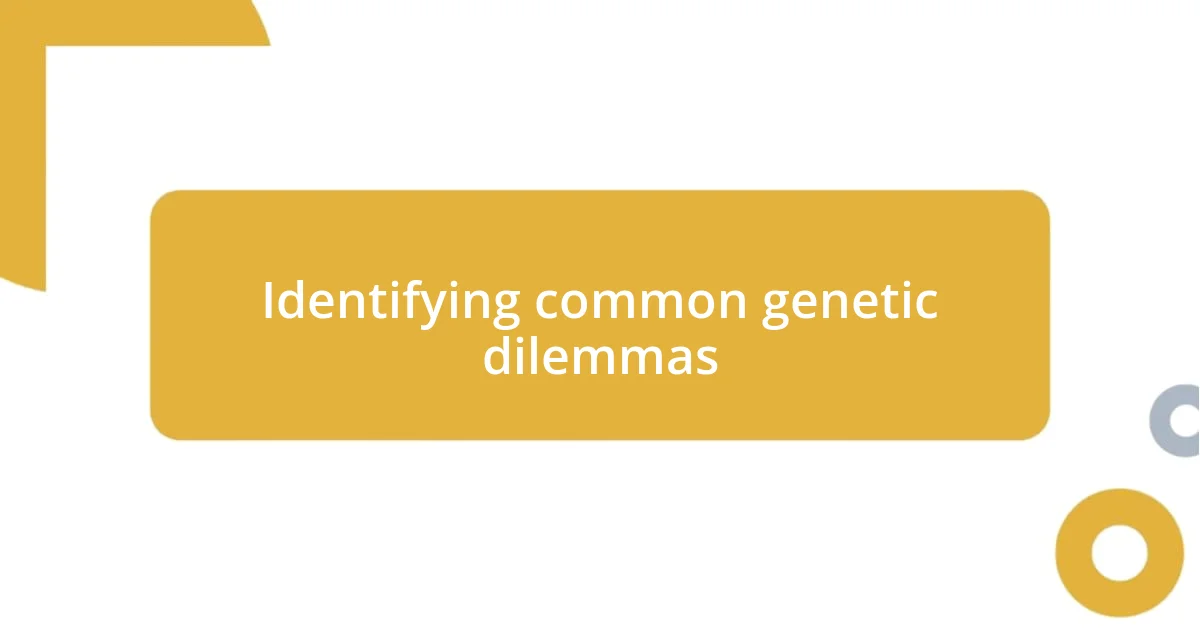
Identifying common genetic dilemmas
Identifying common genetic dilemmas can often feel like peeling back layers of an onion—each layer revealing deeper complexities. For instance, when I first encountered the topic of prenatal genetic testing, I was stunned by the ethical conundrum it presents: should prospective parents have the right to know about potential genetic anomalies? I remember discussing this with a friend who said the knowledge could empower better decisions. Yet, I couldn’t help but wonder—could this also lead to an emotional burden or even pressure to terminate pregnancies?
Another dilemma I’ve grappled with is the accessibility of genetic treatments. I vividly remember attending a conference where a speaker passionately argued about gene therapy’s potential to change lives. While I shared in the excitement, I also found myself questioning: who gets access to these groundbreaking treatments? The disparity between well-funded research institutions and under-resourced communities made me uneasy. Would we really be advancing humanity, or merely widening the gap between the privileged and the underserved?
To further illustrate these dilemmas, here’s a succinct comparison table outlining key genetic dilemmas in our society today:
| Dilemma | Description |
|---|---|
| Prenatal Genetic Testing | Should parents be informed about possible genetic issues, and what are the emotional consequences? |
| Access to Genetic Treatments | How do we ensure equitable access to advanced therapies for all demographics? |
| Gene Editing Ethics | Where should we draw the line between treatment and enhancement? |
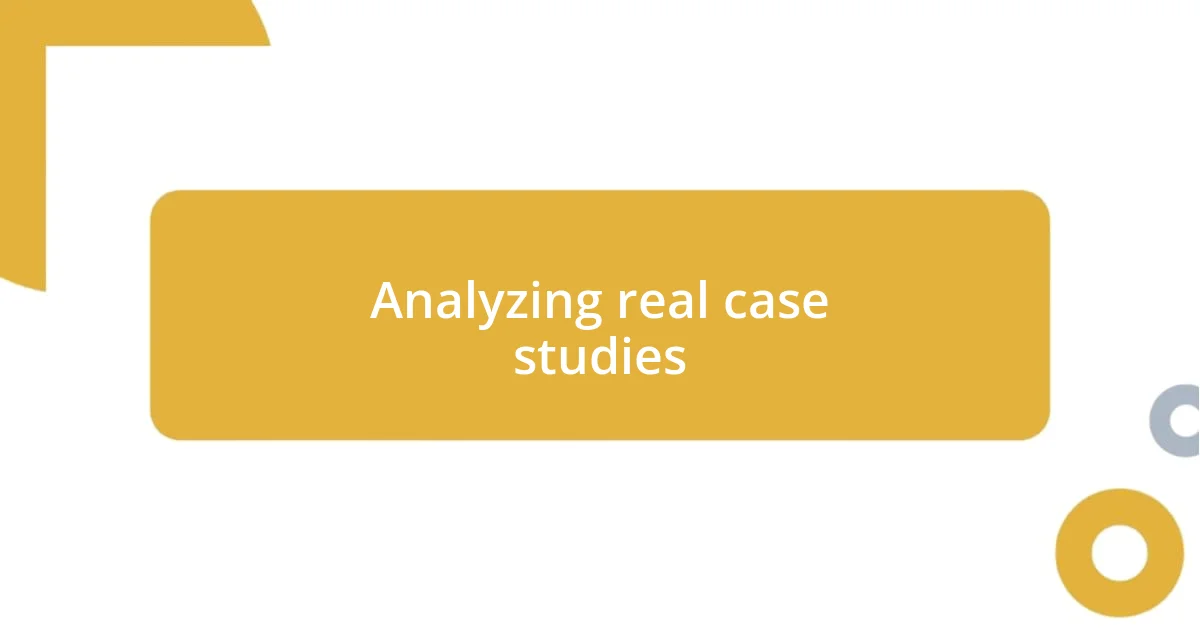
Analyzing real case studies
One case study that sticks with me is the use of CRISPR technology in editing embryos. I recall a heated workshop discussion where a researcher spoke passionately about the potential to eliminate hereditary diseases. As I listened, my mind raced—was it right to alter the course of life for the sake of potential perfection? It stirred a personal conflict in me, as I couldn’t help but think of the unpredictable consequences that might arise, not just for the individual but for future generations. How do we weigh the desire to eradicate suffering against the risks of unforeseen genetic changes?
Another poignant example involves direct-to-consumer genetic testing—where companies tempt us with tantalizing bits of our ancestry or health risk information. I remember my hesitation when a friend suggested we both take a test. On one hand, it promised a new level of self-knowledge, but on the other, I felt a nagging concern about privacy and data security. Would we really be ready to handle the impact of unexpected results? What happens if hidden health risks become a source of anxiety rather than empowerment? It’s a fascinating example of how our thirst for knowledge can collide with ethical considerations we might not have fully articulated.
Then there’s the dilemma of genetic data disparities within communities. At a local health initiative, I found myself surprised by the lack of access to genetic counseling among underserved populations. A woman shared her story of receiving a devastating diagnosis without the support of any genetic resources. It hit me hard to realize that while some of us have the luxury of informed choices, others are left navigating moral waters alone. How can we, as a society, reconcile this inequity? Working on this initiative, I’ve learned that ethical navigation isn’t just theoretical; it’s deeply intertwined with real, lived experiences.
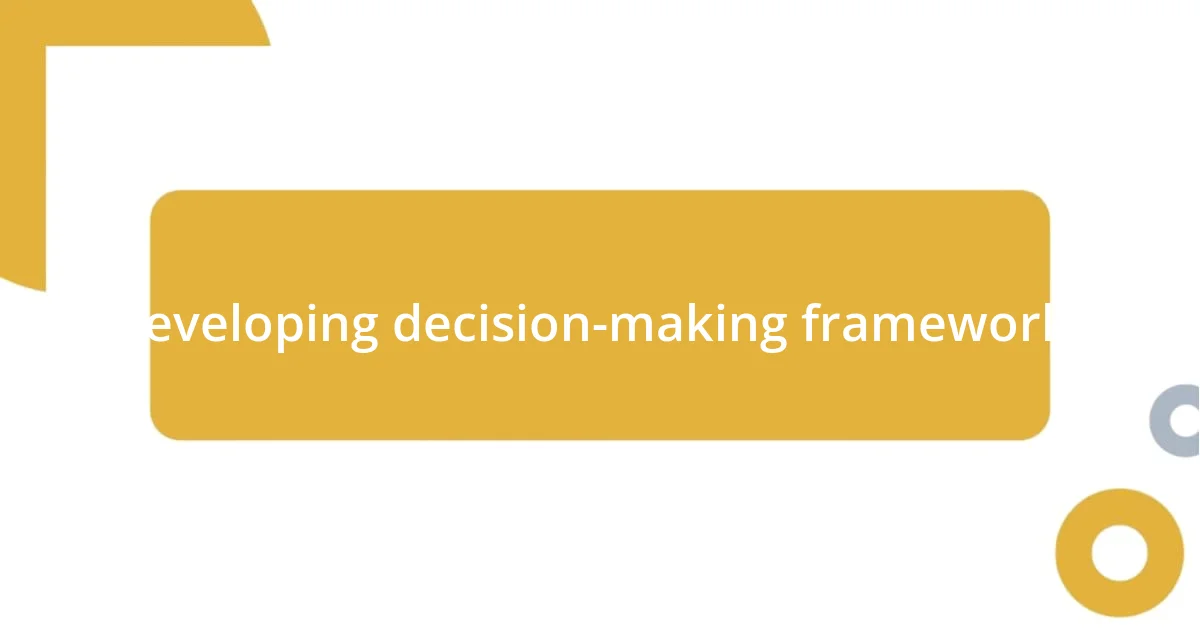
Developing decision-making frameworks
In developing decision-making frameworks, I often find it helpful to reflect on personal values. It’s about more than just considering the ethical implications—it’s about aligning those choices with what truly matters to us. For example, I once used a simple pros and cons list to navigate a tough decision regarding participating in a clinical trial for a gene-editing therapy. The clarity it provided was remarkable, but I also felt the weight of my responsibility towards others who might be affected by my choice.
When creating a framework, engaging in open dialogue with peers can also be immensely beneficial. I remember sitting down with a group of colleagues from various backgrounds to discuss the ethics surrounding genetic screening in children. This conversation revealed perspectives I hadn’t considered, highlighting the importance of inclusivity in ethical discussions. We didn’t just challenge one another; we deepened our understanding of how our various experiences shaped our views and decisions.
Lastly, I think it’s essential to incorporate a feedback mechanism into any decision-making framework. I once decided to revise my approach after a project didn’t go as planned. Gathering insights from those affected helped me recognize blind spots in my reasoning. This not only improved my future decisions but also underscored the idea that ethics is a dynamic process—one that thrives on continuous learning and adaptation. Wouldn’t you agree that embracing that fluidity can lead to more thoughtful outcomes?
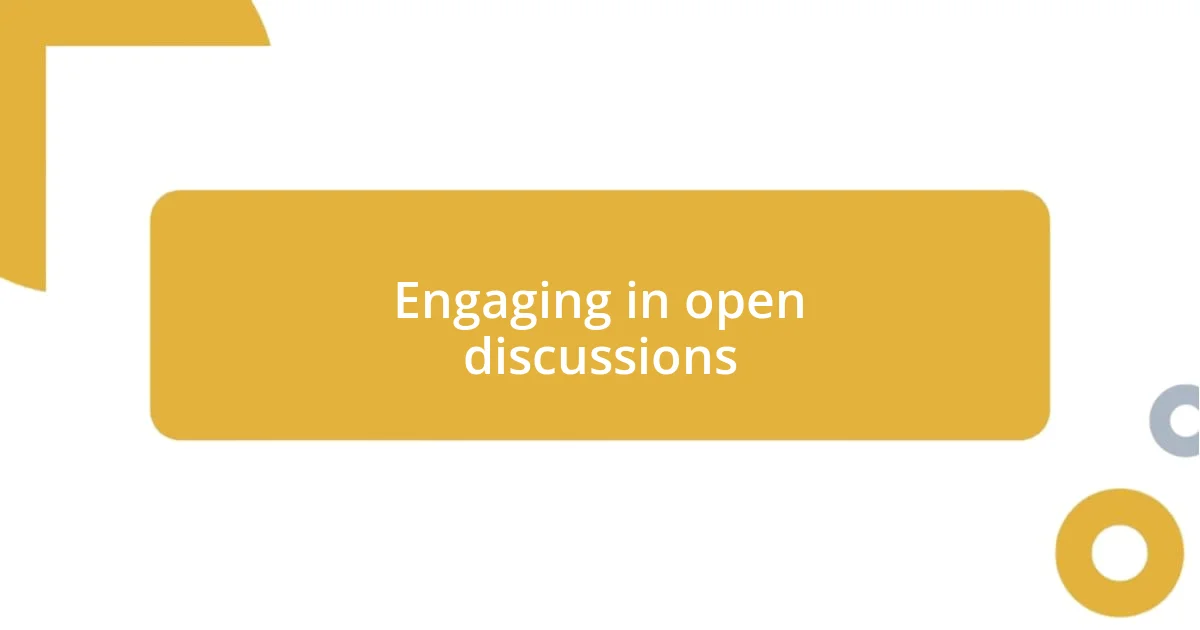
Engaging in open discussions
Engaging in open discussions has been a vital part of my journey. I remember a particularly memorable town hall meeting where community members aired their thoughts on genetic testing initiatives. The diversity of opinions was staggering; some felt it empowered them to make health decisions, while others expressed fear over potential discrimination or insurance implications. Listening to these perspectives opened my eyes to complexities I hadn’t previously considered. Isn’t it fascinating how engaging with different viewpoints can reshape our understanding?
I’ve also found that personal experiences can add richness to these discussions. At a family dinner, the topic of gene therapy came up, and I was astonished to hear my cousin’s emotional recount of watching her child cope with a genetic disorder. Her insights grounded the technicalities of genetics in real-life implications of hope, fear, and love. It made me wonder: how can we ensure that our discussions are not just intellectual debates, but also human-centered dialogues that honor people’s lived experiences?
Furthermore, I believe that exploring ethical dilemmas through open dialogue fosters a sense of community. Last year, I participated in a workshop that encouraged participants to share their fears and hopes regarding emerging genetic technologies. Each story was a thread in a rich tapestry of emotions connected to genetic science. The invitation to share vulnerability ignited passionate conversations that transformed mere facts into a shared quest for ethical clarity. Don’t you think that when we talk openly, we create a collective wisdom that can guide us forward?
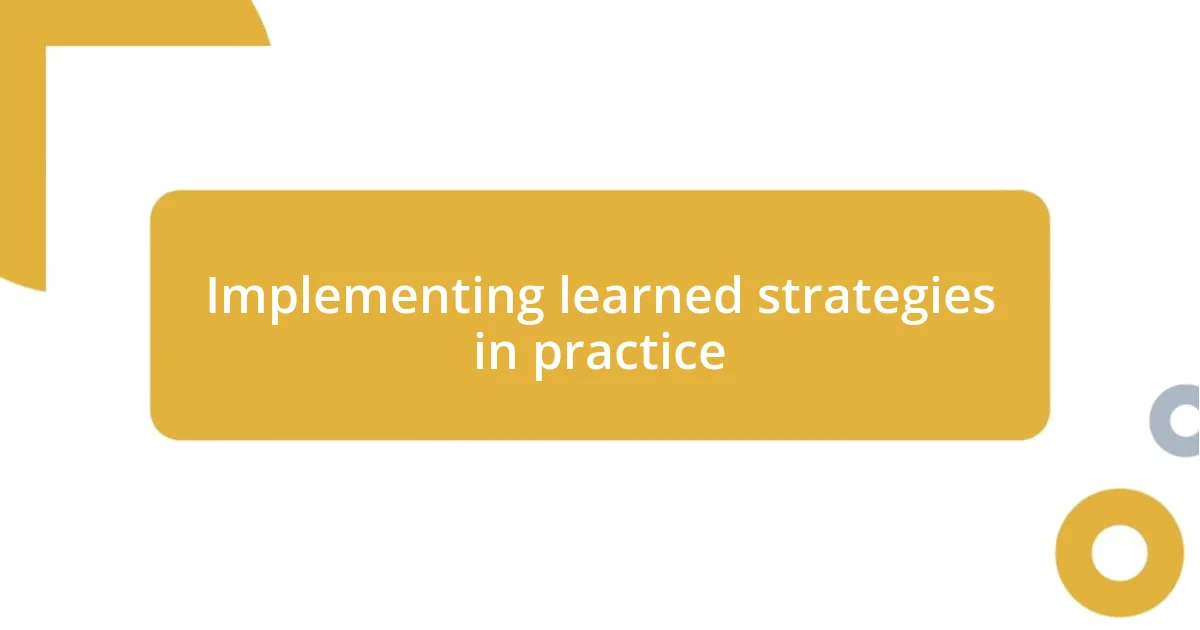
Implementing learned strategies in practice
In practice, I’ve found that applying learned strategies requires an adaptable mindset. During a recent project involving genetic data analysis, I set aside time for reflection after each phase. This practice allowed me to ask myself, “What ethical concerns arose that I hadn’t anticipated?” It was enlightening to revisit my decisions with fresh eyes, often yielding insights that shaped my approach moving forward.
When I decided to implement regular check-ins with my team, it marked a turning point in our project dynamics. One day, during a casual coffee break, our conversation turned to the ethical implications of our findings. A surprising revelation emerged when one colleague shared their family’s struggle with genetic conditions. It highlighted how deeply personal experiences can influence our understanding of ethical practice. I realized that by weaving in personal stories, we create a strong connection that fosters empathy and enhances our collective decision-making.
I’ve also embraced the importance of journaling my thoughts and struggles as I navigate these ethical waters. There was a particularly challenging case about genetic privacy that left me feeling uneasy. As I wrote, I distilled my feelings and fears, transforming them into actionable insights for future discussions. In reflecting this way, I often ask myself, “How can I turn discomfort into clarity?” This approach not only helps me to process complex emotions but also empowers me to advocate for ethical standards that resonate with my core values.












